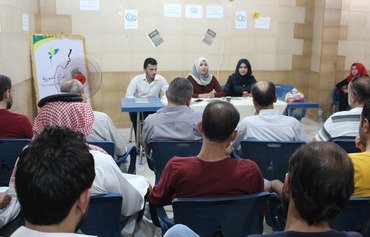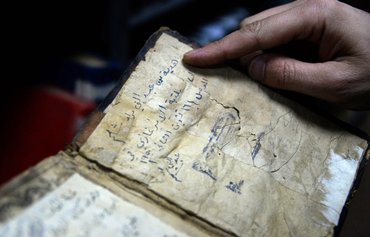AMMAN -- "Who's excited to hear a story?" a Jordanian reading volunteer asks, opening a book at a school in the kingdom's capital as part of an initiative that helps children around the world discover they can find joy in reading.
The "We Love Reading" initiative, now active in 65 countries, was founded by in 2006 by Rana Dajani, an associate professor of biology and biotechnology at the Hashemite University in Jordan.
The initiative has so far helped about half a million children in Jordan, including tens of thousands of Syrian refugees who fled there after the peaceful uprising of 2011 took a violent turn when the Syrian regime brutally suppressed protests.
Dajani spent five years living in the United States, where she enjoyed reading to her children. But when she returned, she noticed schoolchildren in her homeland were rarely reading for pleasure.
!['We Love Reading' founder Rana Dajani poses for a photo at a library in Amman on March 15. [Khalil Mazraawi/AFP]](/cnmi_di/images/2023/05/01/41929-rana-dajani-600_384.jpg)
'We Love Reading' founder Rana Dajani poses for a photo at a library in Amman on March 15. [Khalil Mazraawi/AFP]
She decided to change that, and in 2006 "We Love Reading" was born.
"In the beginning, I noticed that children read only for their school lessons, so I did research and found that the best way is for an adult to read stories to them aloud," Dajani said.
Dajani began with small weekly sessions in a mosque near her house in Amman's Tabarbour neighbourhood, and the initiative gradually expanded.
"We Love Reading" is now active across Jordan, with 4,000 trained volunteers.
"Our programme educates leaders, and it is strong and based on scientific research," Dajani said.
The initiative's March 11 conference, "The Journey of Changemakers", drew scientists from Yale University, Hang Seng University and the Hashemite University.
In addition to the positive impact of reading on children, scholars attending the conference said, research has shown the programme also has a positive social impact on volunteers, who show increased leadership skills and empowerment.
They noted that reading intervention has increased the life satisfaction and well-being of the programme's female readers, and that volunteering diversified women's personal networks outside the home.
'Real paper books'
Each programme ambassador (safir) reads stories to children anywhere the safir chooses, be it a mosque, church, school or nursery.
Dajani said it was important not to read stories on electronic devices, "which we want to keep them away from, because it would be a losing battle. We want real paper books".
The books read to the children reflect their cultural background, according to UNESCO's Institute for Lifelong Learning.
"This means that the stories are easy to understand and show the children how to build positive attitudes and apply best practices in their everyday life," it said.
Illiteracy rates in Jordan have plummeted from 88% in 1952 to 5.1% in 2020, according to official figures, and the programme seeks to ignite a passion for reading among children.
"Through reading, thinking patterns change and the child's brain and psychological health develop," Dajani said.
So far, "We Love Reading" has produced 33 titles for children on topics ranging from the environment, refugees and bullying to gender, social communication and science.
The initiative also has expanded to other countries, with 8,000 trained volunteers internationally. It has won plaudits from across the globe, including a UNESCO award in 2017.
Huda Abu al-Khair has been a reading volunteer in Jordan for four years.
"I loved the idea of the programme, as it develops children's language, ideas and concepts," she said.
"That's why I read to children in kindergarten, during school trips, in public parks and at family gatherings -- whenever I get the chance," she added.
Back at the school in Amman, she gathered round her a group of some 20 children aged four and five, and began to read.
"I am Dina, and this is my brother Hani. We are twins. I came to life minutes before him, but we're alike, and we both love birds, swallows and hummingbirds."
Her narration is accompanied by chirping from a tape recorder, the only nod to modern technology.

![Jordanian teacher Huda Abu al-Khair reads stories to children in a classroom in Amman on March 15, as part of the 'We Love Reading' initiative. [Khalil Mazraawi/AFP]](/cnmi_di/images/2023/05/01/41928-kids-read-amman-600_384.jpg)





